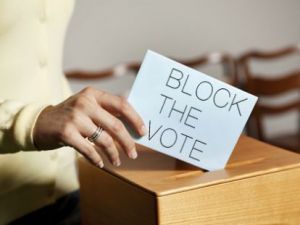
North Carolina’s new voter ID law is ostensibly designed to reduce voter fraud. That’s the official story, anyway. But if that’s the case, why did North Carolina also pass a whole bunch of other voting restrictions, including limits on early voting? Phyllis Schlafly, the doyen of right-wing crankery, explains that the reason was simple: “Early voting plays a major role in Obama’s ground game….[It] is an essential component of the Democrats’ get-out-the-vote campaign.” Steve Benen comments:
Have you ever heard a political figure accidentally read stage direction, unaware that it’s not supposed to repeated out loud? This is what Schlafly’s published column reminds me of.
For North Carolina Republicans, the state’s new voter-suppression measures are ostensibly legitimate — GOP officials are simply worried about non-existent fraud. The response from Democrats and voting-rights advocates is multi-faceted, but emphasizes that some of these measures, including restrictions on early voting, have nothing whatsoever to do with fraud prevention and everything to do with a partisan agenda.
And then there’s Phyllis Schlafly, writing a piece for publication effectively saying Democrats are entirely right — North Carolina had to dramatically cut early voting because it’s not good for Republicans.
Remember, Schlafly’s piece wasn’t intended as criticism; this is her defense of voter suppression in North Carolina. Proponents of voting rights are arguing, “This is a blatantly partisan scheme intended to rig elections,” to which Schlafly is effectively responding, “I know, isn’t it great?”
Actually, I doubt that Schlafly was very far off the reservation here. Generally speaking, I think conservatives have gotten tired of keeping up the pretense about the purpose of their voter suppression laws. Why bother, after all? It might make sense if they needed to convince a few Democrats to join their cause, but that’s obviously hopeless. Alternatively, it might be necessary if they needed to maintain a legal fig leaf for future court cases, but the Supreme Court has ruled that purely partisan motivations for voting laws are A-OK. Finally, they might care about public opinion. And they probably do. But not much.
At this point, the jig is up. Everyone knows what these laws are about, and there’s hardly any use in pretending anymore. In fact, the only real goal of the voter suppression crowd now is to provide a plausible legal argument that what they’re doing isn’t intentionally racist. That’s really the only thing that can derail them at this point, and the best way to fight back is to shrug their shoulders and just admit that they’re being brazenly partisan. That’s what Texas attorney general Greg Abbott did in his brief supporting his state’s voter suppression laws, and he did it with gusto. But if that’s the official argument that you have to make in your legal briefs, there’s not much point in denying it in other forums. You might as well just go with it.
Schlafly wasn’t reading stage directions. She was reading from the script. It’s just a new script, that’s all.















